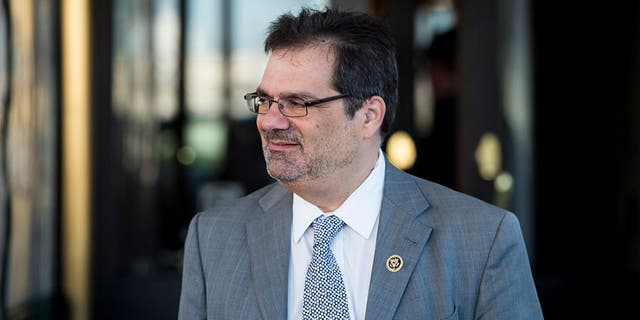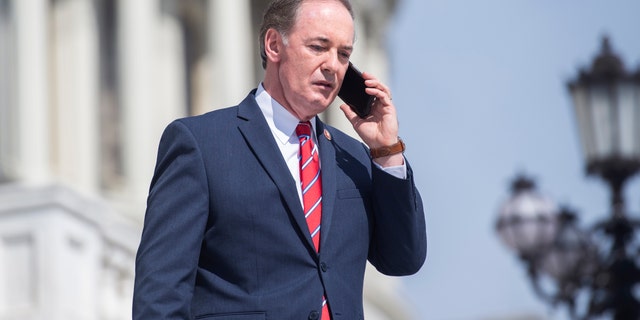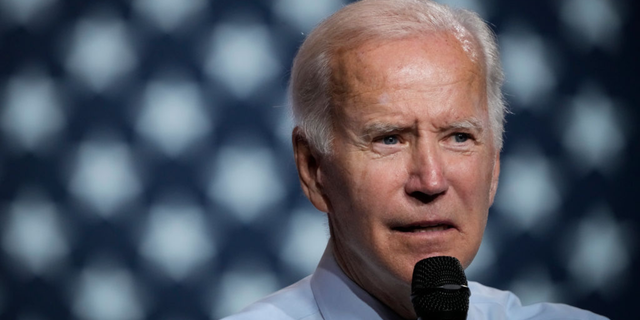FIRST ON FOX: Over 150 Republicans in the House of Representatives are calling on President Biden to reject California’s new radical green car regulations as the state looks to electrify its citizens’ fleet.
Rep. Bob Latta, R-Ohio., led the charge in a letter to Biden with nearly three-fourths of the entire House GOP urging the president to deny the State of California’s Air Resource Board (CARB) Clean Air Act waiver request for new regulations requiring car sellers to phase out gas-powered engines.
CARB’s new regulations would require 35% of all car sales in the state to be electric vehicles by 2026 before completely phasing out internal combustion engines (ICEs) in new car sales by 2035.
TWITTER RIPS GAVIN NEWSOM FOR POWER CONSERVATION PUSH AFTER ELECTRIC VEHICLE MANDATE: ‘DESTROYING THE STATE’
Rep. Bob Latta warned that the war on gas vehicles “will extend far beyond California’s borders and will make it more difficult for Americans to get to work, drop their kids off at school, and travel to visit loved ones.”
(CQ Roll Call)
In order for the regulations to become enforceable, the Golden State needs a Clean Air Act preemption provisions waiver to give them the green light. House Republicans on the letter are calling on Biden to deny their waiver request.
“Earlier this year, America’s energy regulators warned states about elevated risks to the reliability of our electric grid and the increased threat of brown and black outs,” Latta said in a statement to Fox News Digital.
“Instead of heeding those warnings, California politicians are pursuing stifling new regulations to ban gas- and diesel-powered cars by 2035,” the congressman continued. “This effort will extend far beyond California’s borders and will make it more difficult for Americans to get to work, drop their kids off at school, and travel to visit loved ones.”
Latta said that one “cannot forget, California recently alerted residents to substantially reduce their energy consumption, and now, they are contradicting themselves by forcing folks to become more reliant on the electric grid through the mandatory transition from traditional vehicles to electric-only vehicles.”
“These actions are misguided and will further exacerbate the strain on our grid,” Latta added. “California’s proposal is wrong; we must stand up now to preserve the reliability of our nation’s electric grid and the rights of Americans to choose the vehicles they want to drive.”

Rep. Gus Bilirakis called California’s proposal “another example of liberal elitists being detached from the real constraints on the energy grid and the average American consumer.”
(CQ Roll Call)
Rep. Gus Bilirakis, R-Fla., one of the letter’s co-leads, told Fox News Digital “California’s proposal is another example of liberal elitists being detached from the real constraints on the energy grid and the average American consumer.”
“This summer we already saw California’s energy grid struggle to meet growing energy demands, and these proposed regulations would only exacerbate that strain,” Bilirakis said. “With the higher-than-average cost of an EV vehicle, the average Californian might find themselves not only unable to afford a new EV vehicle, but even if they are, potentially unable to keep it reliably charged due to brown or black outs.”
GAVIN NEWSOM BLASTED FOR ASKING CALIFORNIANS TO AVOID CHARGING ELECTRIC VEHICLES DURING HEAT WAVE
“All Americans should have the freedom to choose which vehicle makes the most sense for their particular circumstances and budgets, and the EPA should not enable the Californian elite to set a precedent that could have negative impacts on all Americans,” he added.

Rep. John Joyce said “Americans should not be coerced into making purchases they cannot afford,” referring to pricy electric vehicles.
(CQ Roll Call)
Fellow co-lead Rep. John Joyce, R-Pa., warned “California’s discriminatory waiver request would set a costly and dangerous precedent.”
“Americans should not be coerced into making purchases they cannot afford, and they should be free to drive the roads built with their tax dollars in the vehicles they otherwise would choose to drive,” Joyce said.
“This heavy-handed proposal picks winners and losers, and I am proud to stand with my colleagues in urging the EPA to deny this outrageous request,” he added.
In the letter, the Republicans called on Biden to “reject California’s forthcoming request for this waiver due to widespread concerns for the negative impact it will have on the electric grid, the need for additional power generation, the overreliance on foreign adversaries for critical minerals, and the right of Americans to choose for themselves which vehicles they wish to drive.”
The lawmakers wrote it is “disconcerting that California is attempting to ban ICE vehicles when there have already been real world examples showing California’s grid will not be able to handle the increased electric load,” pointing to the state government calling on residents to not charge their electric vehicles in the middle of a heat wave days after the policy announcement.
“This included a call to set thermostats higher and avoid plugging in major appliances. Under the new ban on ICE vehicles and with the goal of full electrification, California residents may face a future where they will be unable to get to work, shop for groceries at the local market, or pick up their kids from school because they will be unable to charge their vehicles when they want or need.”
“These grid reliability concerns are so obvious that they cannot be ignored,” Latta and the Republicans wrote, adding CARB’s goal to have a fully-electric fleet on the road means “the state would need to be able to generate enough electricity to continuously charge 30 million registered vehicles.”
“If the state’s electric grid is currently struggling to handle more demand for electricity, how will it be able to integrate the additional 2,250,000,000 kWhs it will need to charge its fleet (average 75 kWh electric vehicle battery)?” the lawmakers asked.

President Biden’s green push has drawn fierce criticism from Republicans.
(Drew Angerer/Getty Images)
Outside of the physical limitations of the power grid, the lawmakers warned the new policy “also fails to account for market realities” and pointed to the U.S. Bureau of Transportation Statistics’ numbers showing there are “just under 276 million registered vehicles operating in the United States in 2020.”
Latta and his colleagues also wrote that, through April 2022, “just over 2.3 million plug-in hybrid electric vehicles (PHEVs) and battery electric vehicles (BEVs) have been sold cumulatively in the United States.”
“If the United States did go to an all-EV fleet, as California would like, then where is the plan to convert, recycle, or dispose of the 276 million registered vehicles that are already on the road? How will California stifle the preferences of Americans that would like to purchase new ICE vehicles due to their accessibility, affordability, and reliable infrastructure? These questions need answers.”
The Republicans also raised concerns with the source of materials critical to the production of electric vehicles, such as lithium-ion batteries, of which “China controls more than 70 percent of the world’s” production.
They also wrote that “it seems the loudest supporters of EVs are also the loudest critics of building up our nation’s capacity to secure the materials right here at home.”
“This will help shorten supply chains, which were exposed for their vulnerability during the COVID-19 pandemic, and reduce the United States’ reliance on China, especially at a time when the latter is projecting military aggression in the South China Sea,” the lawmakers wrote.
“Unless the intention is to make it more difficult for Americans to travel and commute, it would be simply impossible to phase out ICE vehicles without addressing these critical mineral concerns,” they added.
Latta and his colleagues argued their raised issues “represent a small sample of the reasons why the EPA should reject California’s request for a waiver of the CAA presumption provisions.”
“Not only are there technical and logistical barriers, but also philosophical concerns with telling the American people what products they can and cannot buy,” they concluded the letter. “We urge you to consider these concerns and allow them to inform EPA’s final decision on the waiver.”
CLICK HERE TO GET THE FOX NEWS APP
Joining Latta, Bilirakis and Joyce on the letter are 155 of their fellow House Republicans, including House Minority Leader Kevin McCarthy of California, House Minority Whip Steve Scalise of Louisiana, House GOP Conference Chairwoman Elise Stefanik of New York, and House Energy and Commerce ranking member Cathy McMorris Rodgers of Washington.
The White House did not immediately respond to Fox News Digital’s request for comment on the letter.
 Milon Shil All About Entertainment, Lander World
Milon Shil All About Entertainment, Lander World